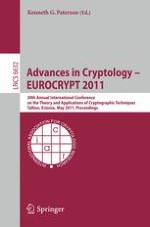2011 | OriginalPaper | Buchkapitel
Key-Dependent Message Security: Generic Amplification and Completeness
verfasst von : Benny Applebaum
Erschienen in: Advances in Cryptology – EUROCRYPT 2011
Verlag: Springer Berlin Heidelberg
Aktivieren Sie unsere intelligente Suche, um passende Fachinhalte oder Patente zu finden.
Wählen Sie Textabschnitte aus um mit Künstlicher Intelligenz passenden Patente zu finden. powered by
Markieren Sie Textabschnitte, um KI-gestützt weitere passende Inhalte zu finden. powered by
Key-dependent message (KDM) secure encryption schemes provide secrecy even when the attacker sees encryptions of messages related to the secret-key
sk
. Namely, the scheme should remain secure even when messages of the form
f
(
sk
) are encrypted, where
f
is taken from some function class
$\mathcal{F}$
. A KDM
amplification
procedure takes an encryption scheme which satisfies
$\mathcal{F}$
-KDM security and boost it into a
$\mathcal{G}$
-KDM secure scheme, where the function class
$\mathcal{G}$
should be richer than
$\mathcal{F}$
. It was recently shown by Brakerski et al. (TCC 2011) and Barak et al. (EUROCRYPT 2010), that a strong form of amplification is possible, provided that the underlying encryption scheme satisfies some special additional properties.
In this work, we prove the first
generic
KDM amplification theorem which relies solely on the KDM security of the underlying scheme without making any other assumptions. Specifically, we show that an elementary form of KDM security against functions in which each output bit either copies or flips a single bit of the key (aka
projections
) can be amplified into KDM security with respect to any function family that can be computed in arbitrary fixed polynomial-time. Furthermore, our amplification theorem and its proof are insensitive to the exact setting of KDM security, and they hold in the presence of multiple-keys and in the symmetric-key/public-key and the CPA/CCA cases. As a result, we can amplify the security of all known KDM constructions, including ones that could not be amplified before.
Finally, we study the minimal conditions under which full-KDM security (with respect to all functions) can be achieved. We show that under strong notion of KDM security, the existence of cyclic-secure fully-homomorphic encryption is not only sufficient for full-KDM security, as shown by Barak et al., but also necessary. On the other hand, we observe that for standard KDM security, this condition can be relaxed by adopting Gentry’s bootstrapping technique (STOC 2009) to the KDM setting.
